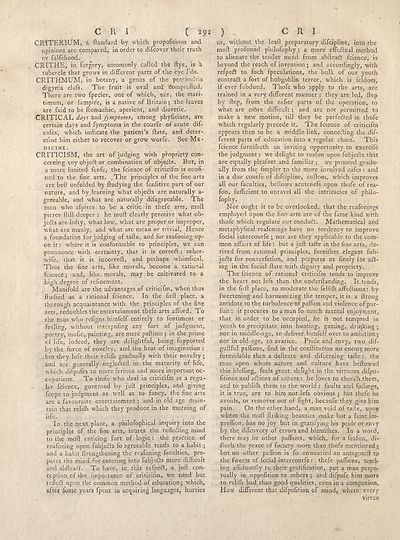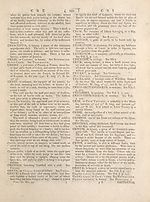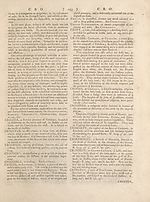Encyclopaedia Britannica; or, A dictionary of arts and sciences, compiled upon a new plan … > Volume 2, C-L
(320) Page 292
Download files
Complete book:
Individual page:
Thumbnail gallery: Grid view | List view

C R I ( 292
CMTERIUM, a ftandard by which propofnioas and
opinions are compared, in order to difcover their truth
or falfehood.
CRITHE, in furgery, commonly called the ftye, is
tubercle that grows in different parts of the eye Eds.
CRITHMUM, in botany, a genus of the pentandria
digynia clafs. The fruit is oval and Comprefied.
There are two fpecies, one of which, viz. the mari-
timum, or fampife, is a native of Britain; the leaves
are faid to be ftomachic, aperient, and diuretic.
CRITICAL dayt and fymptoms, among phyfieians, are
certain days and fymptoms in the courfe of acute dif-
eafes', which indicate the patient’s ftate, and deter¬
mine him either to recover or grow worfe. See Me¬
dicine.
CRITICISM, the art of judging with propriety con¬
cerning any obje<5t or combination of objefts. But, in
a more limited fenfe, the fcience of criticifm is confi¬
ned to the fine arts. .The principles of the fine arts
are bell: unfolded by ftudying the fenfitive part of our
nature, and byjearning what objedts are naturally a-
greeable, and what are naturally difagreeable. The
man who afpires to be a critic in thefe arts, mull
pierce ftill deeper : he mult clearly perceive what ob-
jedts are lofty, what low, what are proper or improper,
what are manly, and what are mean or trivial. Hence
a foundation forjudging of tafte, and for reafoning up¬
on it: where it is conformable to principles, we can
pronounce with certainty, that it is corredt; other-
wife, that it is incorredl, and perhaps whimfical.
Thus the fine arts, like morals, become a rational
fcience; and, like morals, may be cultivated to a
high degree of refinement.
Manifold are the advantages of criticifm, when thus
ftudied as a rational fcience. In the firft place, a
thorough acquaintance with the principles of the fine
arts, redoubles the entertainment thefe arts afford. To
the man who refigns himfelf entirely to fentiment or
feeling, without interpofing any fort of judgment,
poetry, mufic, painting, are mere paftime ; in the prime
of life, indeed, they are delightful, being fupported
by the force of novelty, and the heat of imagination :
_-but they lofe their relilli gradually with their novelty ;
and are generally-neglefted in the maturity of life,
which dilpofes to more ferious and more important oc¬
cupations. To thofe who deal in criticifm as a regu¬
lar feience, governed by jult principles, and giving
fcope to judgment as well as to fancy, the fine arts
are a favouraite entertainment; and in old age main¬
tain that relifh which they produce in the morning of
life.
In the next place, a philofophical inquiry into the
principles of the fine arts, inures the refledbng mind
to the moft enticing fort of logic : the pradtice of
reafoning upon fubjefts fo agreeable tends to a habit;
and a habit ftrengthening the reafoning faculties, pre¬
pares the mind for entering into fubjedts more difficult
and abftradt. To have, in this refpedf, a juft con¬
ception of the importance of criticifm,. we need but
refledt upon the common method of education; which,
after feme years fpent in acquiring languages, hurries
) C R I
us, without the leaft preparatory difeipline, into the
moft profound philofophy : a more effedtual method
to alienate the tender mind from abftradl fcience, is
beyond the reach of invention ; and accordingly, witli
refpedt to fuch fpeculations, the bulk of our youth
contradt a fort of hobgoblin terror, which is feldom,
if ever fubdued. Thofe who apply to the arts, are
trained in a very different manner : they are led, ftep
by ftep, from the eafier parts of the operation, to
what are rribre difficult; and are not permitted to
make a new motion, till they be perfedled in thofe
which regularly precede it. The fcience of criticifm
appears then t-o be a middle link, connedting the dif¬
ferent parts of education into a regular chain'. This
fcience furniffieth an inviting opportunity to exercile
the judgment: we delight to reafon upon fubjedls that
are equally pleafant and familiar; we proceed gradu¬
ally from the fimpler to the more invqlved cafes: and
in a due courfe of difeipline, cuftom, which improves
all our faculties, .bellows acutenefs upon thofe of rea¬
fon, fufficient to unravel all the intricacies of philo¬
fophy.
Nor ought it to be overlooked, that the reafonings
employed upon the fine arts are of the fame kind with
thofe which regulate our condudt. Mathematical and
metaphyfical reafonings have no tendency to improve
focial intercourfe ; nor are they applicable to the com¬
mon affairs of life: but a juft tafte in the fine arts, de¬
rived from rational principles, furniffies elegant fub-
jedts for converfation, and prepares us finely lor adt-
ing in the focial ftate with dignity and propriety.
The fcience of rational criticifm tends to improve
the heart not lefs than the underftanding. It tends,
in the fiift place, to moderate the. felfiffi affedtions: by
fweetening and harmonizing the temper, it is a ftrong
antidote to the turbulence of paffion and violence of pur-
fuit: it procures to a man fo much mental enjoyment,
that in order to be occupied, he is not tempted in
youth to precipitate into hunting, gaming, driqking ;
nor in middle-age, to deliver himfelf over to ambition;
nor in old-age, to avarice. Pride and envy, two dif-
guftful paffions, find in the conftitution no enemy more
formidable than a delicate and difeerning tafte : the
man upon whom nature and culture have beftowed
this bleffing, feels great delight in the virtuous difpo-
fitions and adtions of others : he loves to cheriffi them,
and to publiffi them to the world: faults and failings,
it is true, are to him not lefs obvious ; but thefe he
avoids, or removes out of fight, becaufe they give him
pain. On the other hand, a man void of taile, upop
wheun the moft linking beauties make but a faint im-
preffion, has no joy but in gratifying his pride or envy
by the difeovery of errors and blemiffies. In a word,
there may be other paffions, which, for a feafon, di--
fturb the peace of fociety more than thofe mentioned ;
but no other paffion is fo unwearied an antagonift to
the fweets of.focial intercourfe : thefe paffions, tend¬
ing affiduoully to their gratification, put a man perpe¬
tually in oppofition to others ; and difpofe him more
to reliffi bad than good qualities, even in a companion.
How different that difpofition of mind, where every
virtue
CMTERIUM, a ftandard by which propofnioas and
opinions are compared, in order to difcover their truth
or falfehood.
CRITHE, in furgery, commonly called the ftye, is
tubercle that grows in different parts of the eye Eds.
CRITHMUM, in botany, a genus of the pentandria
digynia clafs. The fruit is oval and Comprefied.
There are two fpecies, one of which, viz. the mari-
timum, or fampife, is a native of Britain; the leaves
are faid to be ftomachic, aperient, and diuretic.
CRITICAL dayt and fymptoms, among phyfieians, are
certain days and fymptoms in the courfe of acute dif-
eafes', which indicate the patient’s ftate, and deter¬
mine him either to recover or grow worfe. See Me¬
dicine.
CRITICISM, the art of judging with propriety con¬
cerning any obje<5t or combination of objefts. But, in
a more limited fenfe, the fcience of criticifm is confi¬
ned to the fine arts. .The principles of the fine arts
are bell: unfolded by ftudying the fenfitive part of our
nature, and byjearning what objedts are naturally a-
greeable, and what are naturally difagreeable. The
man who afpires to be a critic in thefe arts, mull
pierce ftill deeper : he mult clearly perceive what ob-
jedts are lofty, what low, what are proper or improper,
what are manly, and what are mean or trivial. Hence
a foundation forjudging of tafte, and for reafoning up¬
on it: where it is conformable to principles, we can
pronounce with certainty, that it is corredt; other-
wife, that it is incorredl, and perhaps whimfical.
Thus the fine arts, like morals, become a rational
fcience; and, like morals, may be cultivated to a
high degree of refinement.
Manifold are the advantages of criticifm, when thus
ftudied as a rational fcience. In the firft place, a
thorough acquaintance with the principles of the fine
arts, redoubles the entertainment thefe arts afford. To
the man who refigns himfelf entirely to fentiment or
feeling, without interpofing any fort of judgment,
poetry, mufic, painting, are mere paftime ; in the prime
of life, indeed, they are delightful, being fupported
by the force of novelty, and the heat of imagination :
_-but they lofe their relilli gradually with their novelty ;
and are generally-neglefted in the maturity of life,
which dilpofes to more ferious and more important oc¬
cupations. To thofe who deal in criticifm as a regu¬
lar feience, governed by jult principles, and giving
fcope to judgment as well as to fancy, the fine arts
are a favouraite entertainment; and in old age main¬
tain that relifh which they produce in the morning of
life.
In the next place, a philofophical inquiry into the
principles of the fine arts, inures the refledbng mind
to the moft enticing fort of logic : the pradtice of
reafoning upon fubjefts fo agreeable tends to a habit;
and a habit ftrengthening the reafoning faculties, pre¬
pares the mind for entering into fubjedts more difficult
and abftradt. To have, in this refpedf, a juft con¬
ception of the importance of criticifm,. we need but
refledt upon the common method of education; which,
after feme years fpent in acquiring languages, hurries
) C R I
us, without the leaft preparatory difeipline, into the
moft profound philofophy : a more effedtual method
to alienate the tender mind from abftradl fcience, is
beyond the reach of invention ; and accordingly, witli
refpedt to fuch fpeculations, the bulk of our youth
contradt a fort of hobgoblin terror, which is feldom,
if ever fubdued. Thofe who apply to the arts, are
trained in a very different manner : they are led, ftep
by ftep, from the eafier parts of the operation, to
what are rribre difficult; and are not permitted to
make a new motion, till they be perfedled in thofe
which regularly precede it. The fcience of criticifm
appears then t-o be a middle link, connedting the dif¬
ferent parts of education into a regular chain'. This
fcience furniffieth an inviting opportunity to exercile
the judgment: we delight to reafon upon fubjedls that
are equally pleafant and familiar; we proceed gradu¬
ally from the fimpler to the more invqlved cafes: and
in a due courfe of difeipline, cuftom, which improves
all our faculties, .bellows acutenefs upon thofe of rea¬
fon, fufficient to unravel all the intricacies of philo¬
fophy.
Nor ought it to be overlooked, that the reafonings
employed upon the fine arts are of the fame kind with
thofe which regulate our condudt. Mathematical and
metaphyfical reafonings have no tendency to improve
focial intercourfe ; nor are they applicable to the com¬
mon affairs of life: but a juft tafte in the fine arts, de¬
rived from rational principles, furniffies elegant fub-
jedts for converfation, and prepares us finely lor adt-
ing in the focial ftate with dignity and propriety.
The fcience of rational criticifm tends to improve
the heart not lefs than the underftanding. It tends,
in the fiift place, to moderate the. felfiffi affedtions: by
fweetening and harmonizing the temper, it is a ftrong
antidote to the turbulence of paffion and violence of pur-
fuit: it procures to a man fo much mental enjoyment,
that in order to be occupied, he is not tempted in
youth to precipitate into hunting, gaming, driqking ;
nor in middle-age, to deliver himfelf over to ambition;
nor in old-age, to avarice. Pride and envy, two dif-
guftful paffions, find in the conftitution no enemy more
formidable than a delicate and difeerning tafte : the
man upon whom nature and culture have beftowed
this bleffing, feels great delight in the virtuous difpo-
fitions and adtions of others : he loves to cheriffi them,
and to publiffi them to the world: faults and failings,
it is true, are to him not lefs obvious ; but thefe he
avoids, or removes out of fight, becaufe they give him
pain. On the other hand, a man void of taile, upop
wheun the moft linking beauties make but a faint im-
preffion, has no joy but in gratifying his pride or envy
by the difeovery of errors and blemiffies. In a word,
there may be other paffions, which, for a feafon, di--
fturb the peace of fociety more than thofe mentioned ;
but no other paffion is fo unwearied an antagonift to
the fweets of.focial intercourfe : thefe paffions, tend¬
ing affiduoully to their gratification, put a man perpe¬
tually in oppofition to others ; and difpofe him more
to reliffi bad than good qualities, even in a companion.
How different that difpofition of mind, where every
virtue
Set display mode to:
![]() Universal Viewer |
Universal Viewer | ![]() Mirador |
Large image | Transcription
Mirador |
Large image | Transcription
Images and transcriptions on this page, including medium image downloads, may be used under the Creative Commons Attribution 4.0 International Licence unless otherwise stated. ![]()
| Encyclopaedia Britannica > Encyclopaedia Britannica; or, A dictionary of arts and sciences, compiled upon a new plan … > Volume 2, C-L > (320) Page 292 |
|---|
| Permanent URL | https://digital.nls.uk/144917464 |
|---|
| Attribution and copyright: |
|
|---|
| Description | Ten editions of 'Encyclopaedia Britannica', issued from 1768-1903, in 231 volumes. Originally issued in 100 weekly parts (3 volumes) between 1768 and 1771 by publishers: Colin Macfarquhar and Andrew Bell (Edinburgh); editor: William Smellie: engraver: Andrew Bell. Expanded editions in the 19th century featured more volumes and contributions from leading experts in their fields. Managed and published in Edinburgh up to the 9th edition (25 volumes, from 1875-1889); the 10th edition (1902-1903) re-issued the 9th edition, with 11 supplementary volumes. |
|---|---|
| Additional NLS resources: |
|

